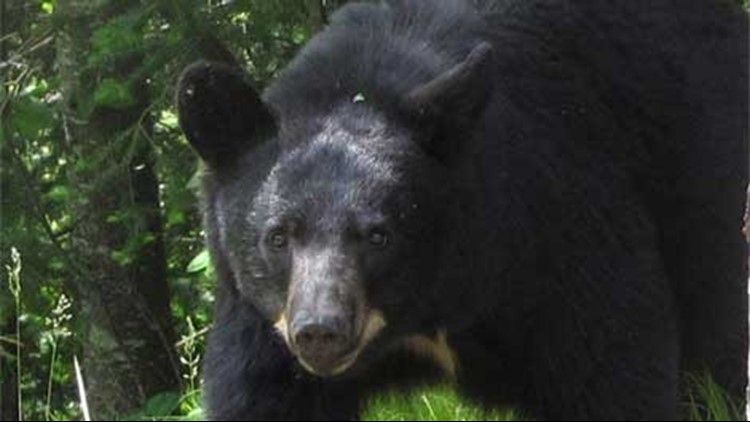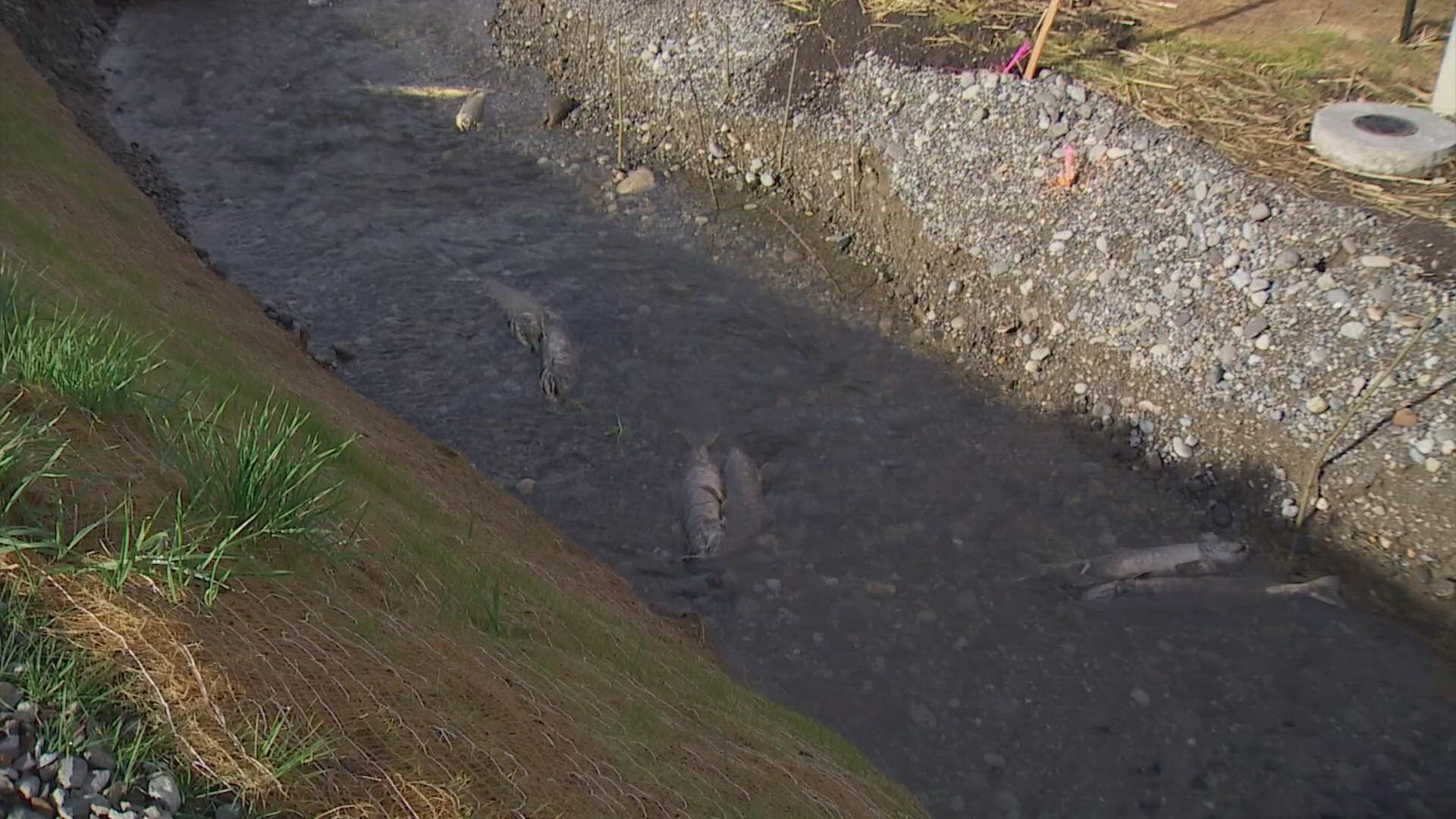A Thurston County judge has granted a temporary injunction to stop Washington wildlife managers from issuing new permits to kill black bears on private timberland using hunting methods banned by voters two decades ago.
The ruling comes one year after KING 5 aired its initial reports about the Bear Timber Depredation Management program. The investigation has spanned two years and hundreds of internal documents requested through public disclosure.
"To our knowledge, 73 permits have been issued this year which would allow the killing of 146 bears using these banned methods. Of those, we're aware of 44 that are valid past today," attorney Claire Davis told Judge Carol Murphy. "Neither the state nor the interveners have shown any need to kill these bears now using these methods rather than using an alternate means to address any harm that would continue through the rest of the season."
Davis represents the Center for Biological Diversity (CBD), which sued the Department of Fish and Wildlife last month, alleging it exploits narrow exceptions to two voter-approved initiatives by allowing hunters to use bait, dogs and body-gripping traps to kill bears on private commercial timberland.
KING 5 was the first to report that the state's own employees were alarmed that timber farms and hunters were abusing the system, all with the state's blessing. Instead of targeting problem bears, the documents show, critics say the program is used to reduce the number of bears in tree stands.
In 2017, WDFW's own game manager, Anis Aoude, told KING, "You're never going to know what bears are peeling and what bears are not."
Still, attorneys for the state and the Washington Forest Protection Association (WFPA) argued the opposite, claiming the hunts are specific.
"Once a bear starts peeling, it is difficult to get that peeler bear to stop. That is why the property owners ask to target the problem bear and ask the department to act quickly," said Martha Wehling, who is representing WDFW from the Attorney General's Office.
"This is a narrow use. They're not interested in overuse or creating recreation out of this program. It's to control real and actual and substantial damage that occurs every Spring," added Diane Meyers, the attorney for the Washington's Animal Damage Control Program.
"I would submit that none of those things are true and they are contested not just by the Center but by the state's own employees including the state's own bear expert in document after document after document, which has been submitted in support of this motion," Davis retorted.
The injunction issued Friday by Superior Court Judge Carol Murphy suspends that specific program until the court can review the case. It does not affect permits already issued.
The state had argued that issuing the injunction would lead to significant property damage. Murphy ordered the conservation group to post a $100,000 bond. If CBD loses the lawsuit and timber farmers show they suffered damages from the injunction, the bond will go to timber farmers who claim bears damaged their trees during the injunction.
The lawsuit says the state has authorized about 900 black bears to be killed using bait, dogs and traps since 2010.
The lawsuit follows a two-year KING 5 investigation into the Bear Depredation Management Program, a state run program that permits timber farmers to contract with hunters to kill bears that peel trees.
Bears are often hungry after hibernation, and when they wake up near large tree farms, the syrup under the bark offers a quick and sugary snack. When bears peel trees, however, they can damage or even kill them. Foresters blame bears for millions of dollars in lost revenue every year.
The hunters who kill the bears are allowed to employ two practices outlawed by voters in the 1990s: Using hounds and bait. Both were deemed cruel and unethical by voters in nearly all legislative districts across the state.
KING 5 found a loophole in the law, though. If a bear is causing problems, agents of the state are allowed to continue using bait and dogs, but they must target an animal known to be causing damage. The loophole does not allow for an indiscriminate thinning of bears in tree stands in order to reduce the potential for problems. In KING 5's investigation, hundreds of documents revealed the state is allowing hunters to do exactly that, often giving kill permits to foresters as a prevention tool.
"If we were to apply the same types of evidentiary proof to people that we're looking at for bears, in essence what you would say is, a crime was committed in this neighborhood, just round up all the people you see in that area," said CBD Programs Directory Peter Galvin. "We would look at that and stay, that's outrageous. You can't just simply start rounding up people who may or may not be responsible for what you're concerned about. This is what they're doing for bears."
The lawsuit demands that no more kill permits be issued until the program comes in line with state law.
"WDFW has kept the Program out of public view because it knows that it would be deeply unpopular. Not only does the Program use hunting methods that Washington voters have voted to criminalize, but a poll commissioned by WDFW in 2014 indicates that Washington citizens overwhelmingly oppose the killing of black bears by any means to prevent damage to timber on commercial timberlands, with 70% of voters opposing such killing, and only 17% in favor," the lawsuit reads.
WDFW declined a request for comment.
The kill permits allow for the take of two bears, even if only one tree has damage. For many years, foresters could kill bears based on damage from the previous year. Those were called "historical damage permits" and allowed the killing of two bears even if no new damage occurred. Those stopped after KING's investigation, and WDFW admitted the practice could make it vulnerable to a lawsuit.
The program got a new manager last year, Dan Brinson, who has taken a more critical approach, planning to develop a stakeholder group like the one formed for wolves.
"We want to use that same process here and it just makes sense that the best possible product can come from those people that it mostly effects," Brinson said.
That group has been plagued with delays though and has yet to materialize.
Critics believe the state has created a secret hunting club with rule changes whenever political or economic whim demands it, often bowing to pressure from special interest groups over following the law.
"In addition to the 2016 Guidance, WDFW has continually made substantive changes to the Program though more informal means, such as by adjusting the language of the Permits and application materials, or changing the rules for enforcement, often without notice to its own staff. In at least one circumstance, WDFW staff admitted that the agency left the language of the Permits deliberately ambiguous, so that it could have the freedom to change its mind later about what the policy meant," the lawsuit reads. "The result has been a chaotic program over which WDFW staff has repeatedly raised serious concerns, including concerns regarding its legality and lack of meaningful standards."
"People have raised concerns about this for quite a few years. They've had a lot of time to try to come up with solutions. Frankly, we think they only reason they've accelerated their rhetoric to find a solution is because they know this lawsuit is coming," said CBD Programs Director Peter Galvin.
Galvin believes the state needs to start working with timberland owners to develop forestry methods that promote more of the bear's natural diet within monoculture tree stands.
"We were appalled to find out that the state Department of Fish and Wildlife has continued to use these practices under the loophole of depredation. In reality what's occurred is that they've institutionalized a bear hunting program under another name," Galvin said. "They've taken what was a small exemption in the voter initiative and driven a Mack truck through it."
The Associated Press contributed to this report.



